Pericardium: Fire-energy yin organ. 7-9pm
It’s 20.12so it’s time to do the little qigong exercise which will help to stimulate and massage the pericardium meridian as well as massaging the triple heater meridian and area .
First I will introduce a deeper understanding of the pericardium and then finish off with an explanation on the exercise to do .
http://lieske.com/channels/5e-pericardium.htm
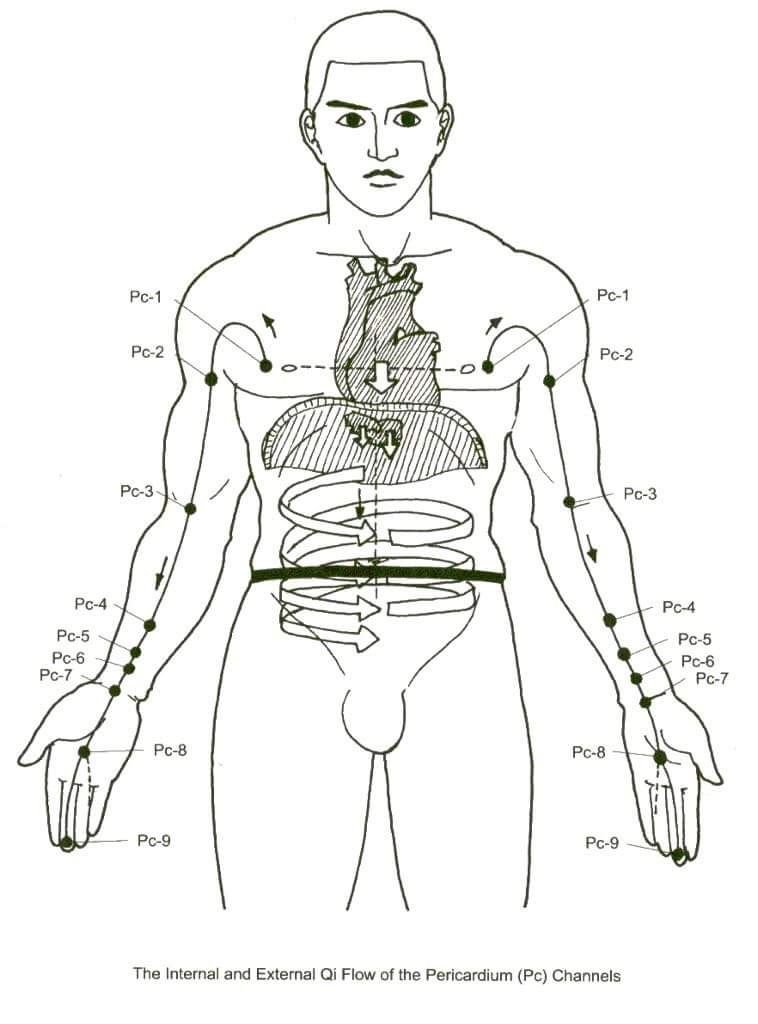
Internal Trajectories of the Pericardium Meridian
Pericardium: Fire-energy yin organ. 7-9pm
The vessel of the master of the heart, hand jue yin, heart wrapping luo [pericardium], starts at the inside of the chest, comes out and permeates the heart-wrapping luo, passes down through the diaphragm, then timelessly spirals down through the triple warmers.
The "inside of the chest" is commonly viewed as CV-17. The internal trajectory starts at CV-17, then passes to the pericardium. From here it passes downwards, probably along the aorta or the esophagus, through the diaphragm, then "timelessly" spirally wraps the triple warmers.
The idea of timelessness offers fascinating insights into the nature of the triple warmers.
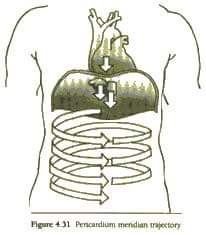
The character we translate as timeless is li
!

. This character has a number of different meanings, including "to pass through" and "successively." Our selection of "timeless" is based on the Nan Jing and Zhuang Zi. We propose that this interpretation ameliorates commonly emphasizing the absolute energetic nature of these concepts. In a discussion relating to the reasons why there are five yin organs and six yang organs, the Nan Jing comments:
The triple burner has the function of dividing the source qi and controlling each of these qi. This has a name but no form.
Another passage discusses the same problem:
The master of the heart with the triple warmer are the outside and lining of the body. They have a name but they have no form
This idea of "no form", in this context, is usually seen to refer to the absence of a physical organ in the body for the set of functions which we identify as the triple warmer. It actually has much deeper implications than the absence of physical substance
The term "no form", wu xing, is used by Zhuang Zi. We feel that the Nan Jing references the idea of no form from Zhuang Zi.
Absolute jing has no form. The jing is tinier than the small [the concept of smallness]. Rough jing has form. No form means that it cannot be divided further.
The idea of no form does not simply refer to absence of material substance. It refers to the essential change of state between matter and energy, to the basic underlying substrate of material substance. Much like the concept of the atom in pre-relativistic physics, or quarks and multidinous sub-atomic particles of current physics, it is the theoretical smallest particle of matter. The "absolute jing" is the precursor of matter or form. While it is always delightful to find an idea of such sophistication in an ancient medical text which Western scientific prejudice has overlooked, this is not such a rare idea. Other classical texts have referred to the concept of no form in similar terms and we will meet this idea again in our studies. For now, however, the essential information that we must relate to the interior energetics from classical description is the sense that rather than the attachments of so many imaginary wires, the connections indicated are the confluence of quintessential forces. What occurs at this intersection is not completely described by a terminology that allows us to think of the connection of simple electrical currents. It is more like the opposed coils of a generator or transformer where the currents create a change of state or a cyclotron where matter becomes energy.
While admitting that the "passing through" translation of the character li
is sufficient for the description of the body's interior "wiring diagram," and certainly less subject to the criticism of orthodox translation, it lacks the recognition of the profound relativism of the classical idea of energy. It is not just that the trajectory of the pericardium intersects the triple warmer. The pericardium and triple warmer intertwine and become identical. It is not just that both the triple warmer and pericardium have no material organ. Both are gateways to an energetic environment that is not limited by the boundaries of form. Space, matter, and time are not descriptions that suit the "tiny absolute jing." These are the dimensions of form, not the boundaries of energy.
We feel at least poetically justified to allow the concept of timelessness to indicate that this deep, interior connection represented for the classical authors a boundary where the particular human energies of the body meet and become the more absolute energies of cosmology.
Regardless of our reader's willingness to accept our feelings that there is a tremendous relativism in the ideas, the fact remains that the master of the heart, the heart-wrapping luo (pericardium) is intimately connected to the triple warmer. It carries out similar functions. There are effectively three distinct aspects of this meridian. The first is the branch, arm jue yin, which emerges at PC-1 and passes down the arms to PC-9. The second is the heart-wrapping luo which is a trajectory that passes only around the heart, in normal usage, the pericardium. The third is the master of the heart. There are many places (for instance Ling Shu) where these three names are used in reference to the one meridian.
Diagrammatically these three aspects can be seen as follows: The master of the heart most logically relates to the aorta. It is an extension of the heart; branching from this is the heart-wrapping luo and the arm jue yin. That arm jue yin branches from the master of the heart is something we can derive by inference from an understanding of how the other meridians branch from their main pathways, and from the text of the Ling Shu:
The heart-wrapping luo is the vessel of the master of the heart.
The master of the heart is likely the main pathway, with both arm jue yin and the heart-wrapping luo as branches.
The master of the heart carries out the functions of the shen; the heart stores the shen. The pericardium, heart-wrapping luo, functions to protect the heart from all types of disturbance. If the heart is injured, the shen will be disturbed and this will result in death or an incurable disease. The master of the heart functions energetically as a communicative pathway for the shen between the heart and the moving qi between the kidneys. In conceptualizing these pathways and functions, it is even possible to see this pathway as the meridian of the "small heart" or ming men:
The Su Wen says, "AT the sides of the seventh vertebra on the inside, is the small heart." Mr. Yang, the writer of the Tai Su, says, "There are twenty-one vertebrae in the person. Counting upwards from the lower parts, to the sides of the seventh vertebra, on the left is the kidney, on the right is ming men. Ming men is the small heart." The Nan Jing says, "The source of the heart comes out at PC-7; thus PC-7 belongs to arm jue yin. Wrapping-luo, helping fire, this is the meridian of the small heart."
This particular passage from Liu Wan Su gives us a significant description of the pericardium meridian, as it is commonly called, and its various internal trajectories. This significance will become clearer in later chapters. For now, however, we may expand our diagrammatic representation of the internal trajectories to the kidney (see last figure).
Now the exercise to do between the times of 7-9pm fr maximum benefit
Picture no 1
Stand straight with your knees slight bent bring your right hand to just in front of your face in line with the third eye palm facing outwards ,your left hand s palm facing down just below your belly button but above the pubic bone .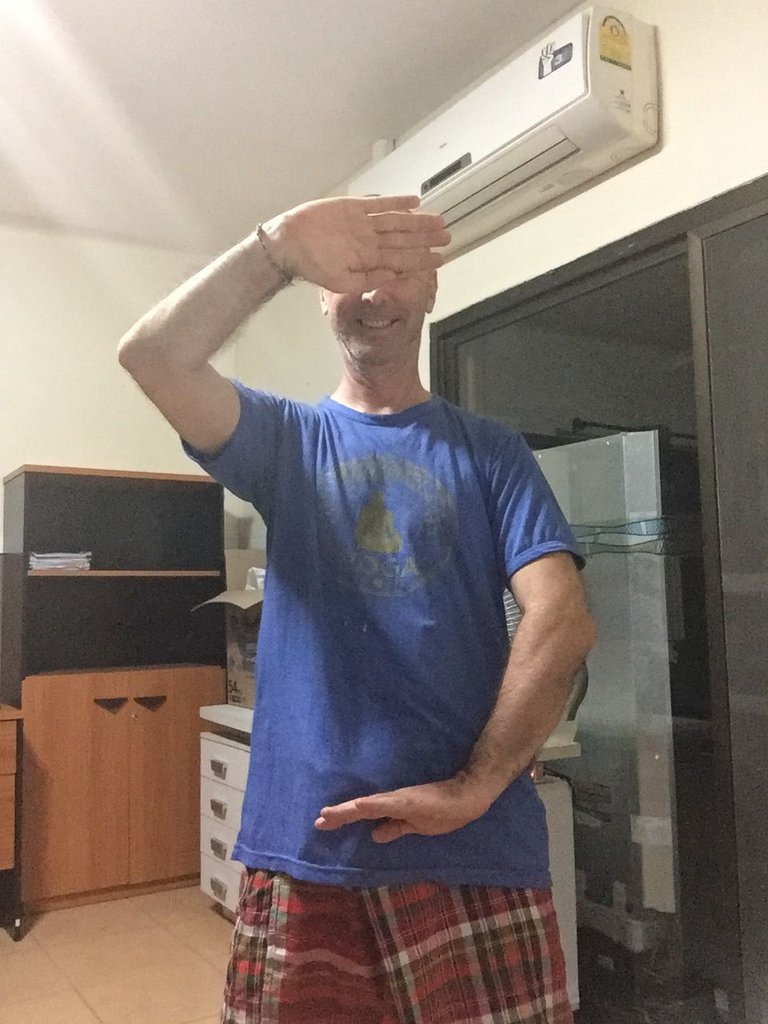
twist to the right as far as you can !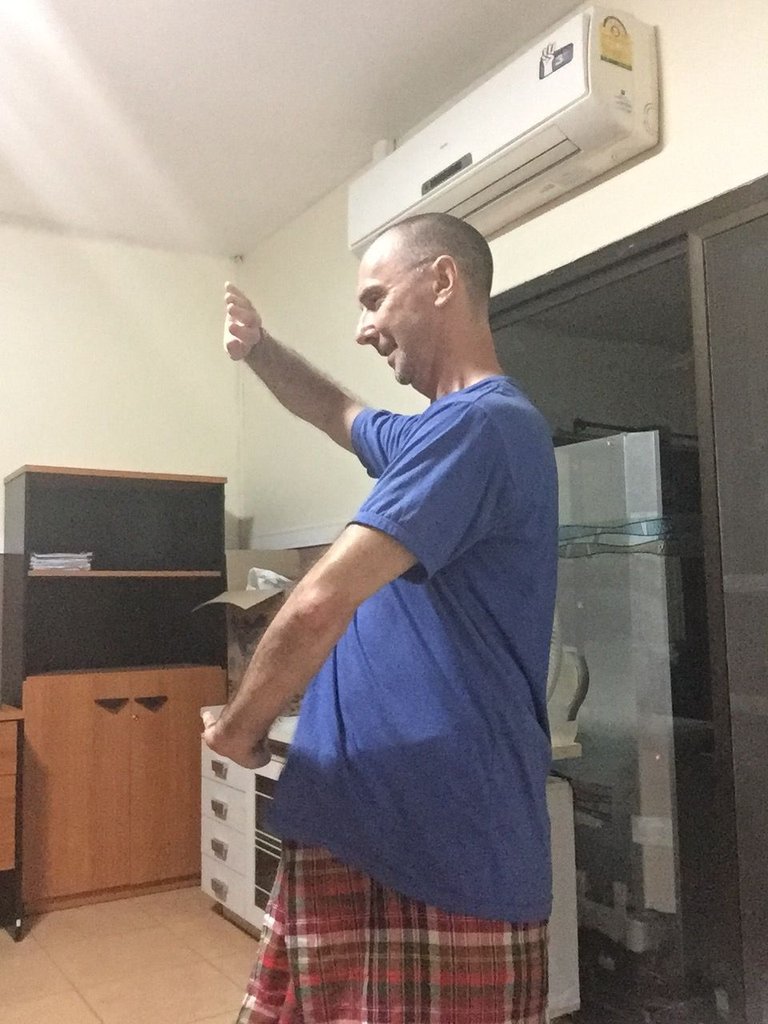
Then twist to the left as far as you can 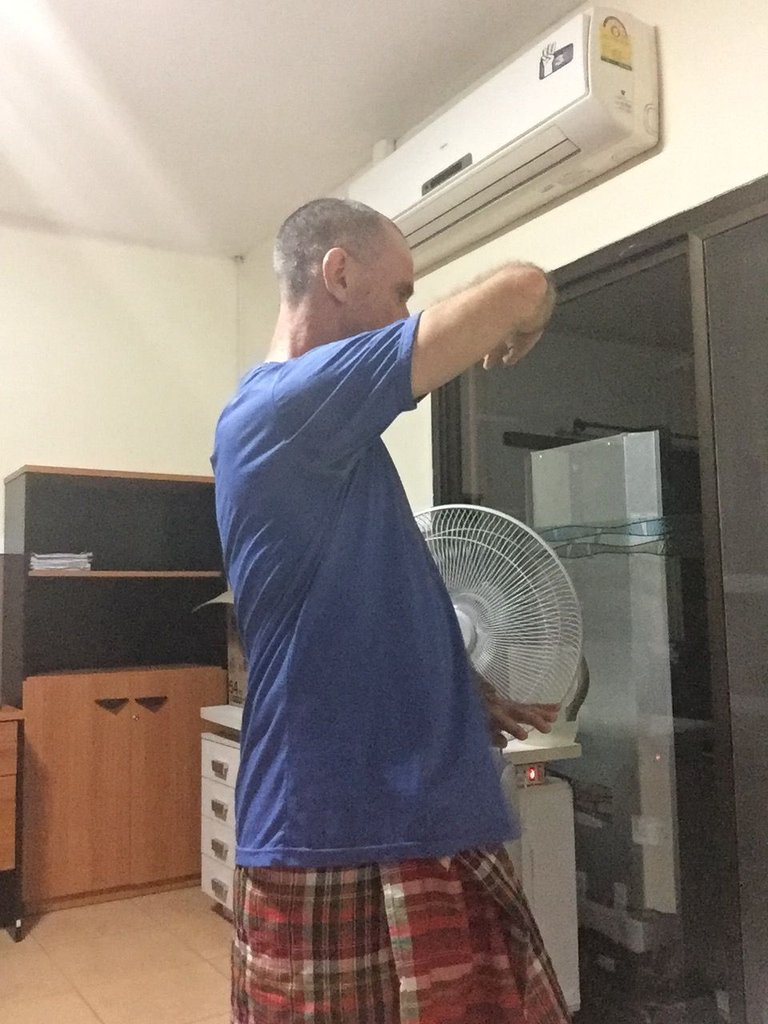
come back to the middle change hand position
make a full circle and have your left hand on top opposite the third eye and right hand at just above the pubic bone palm down 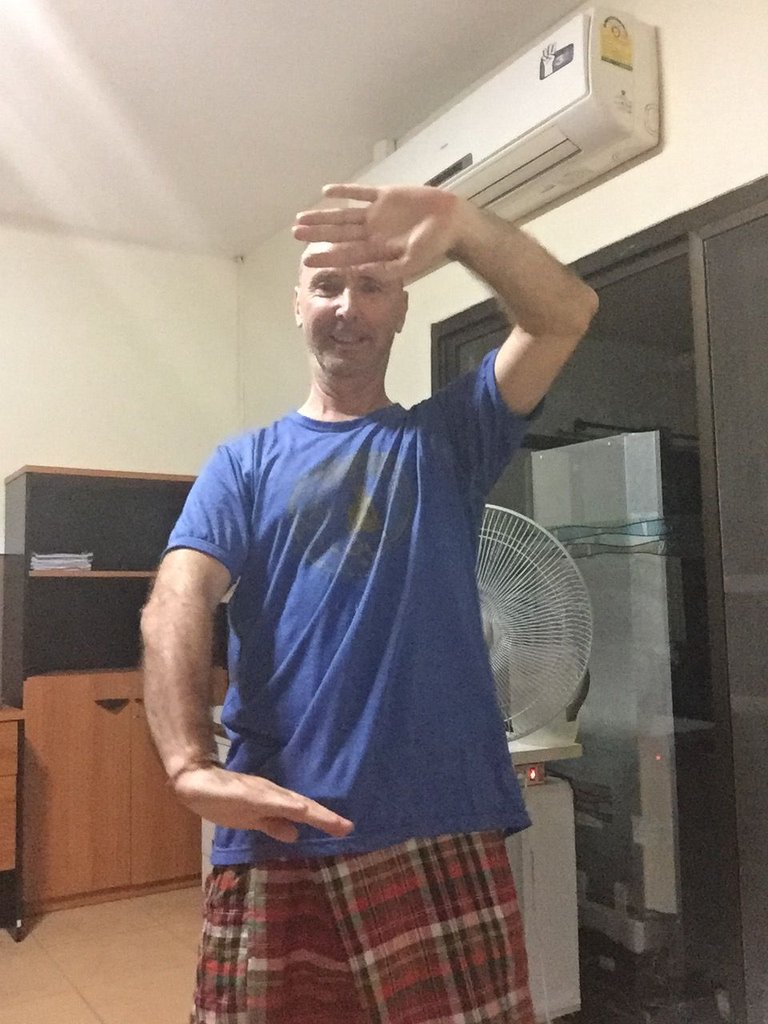
twist to the left 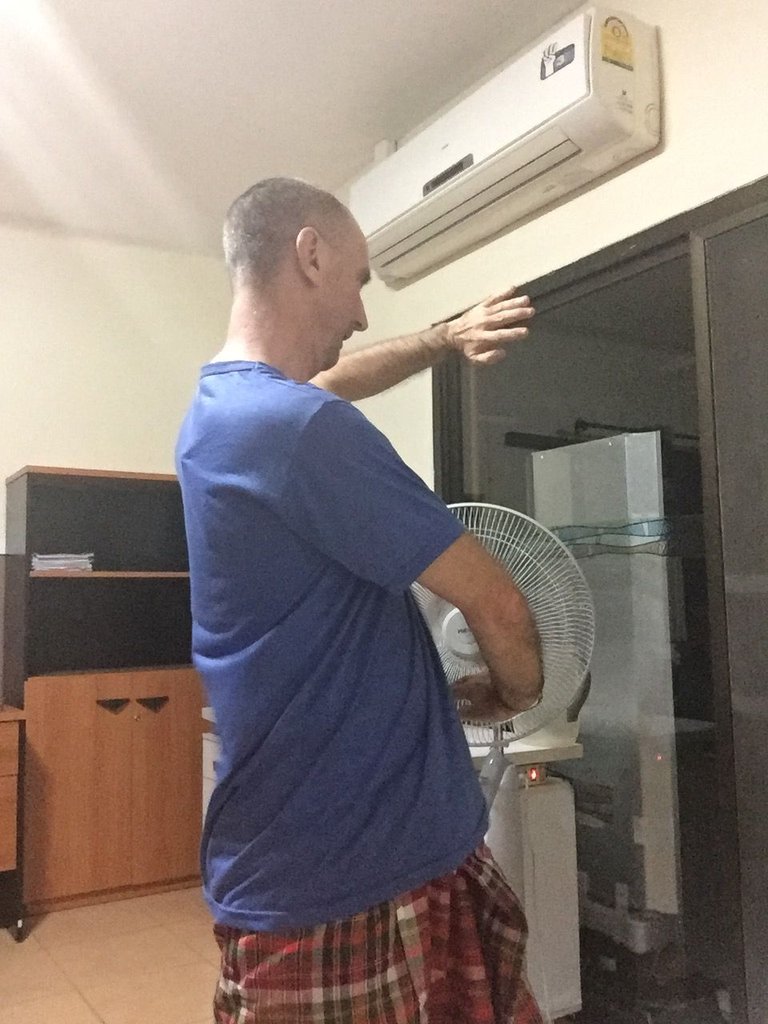
twist to the right 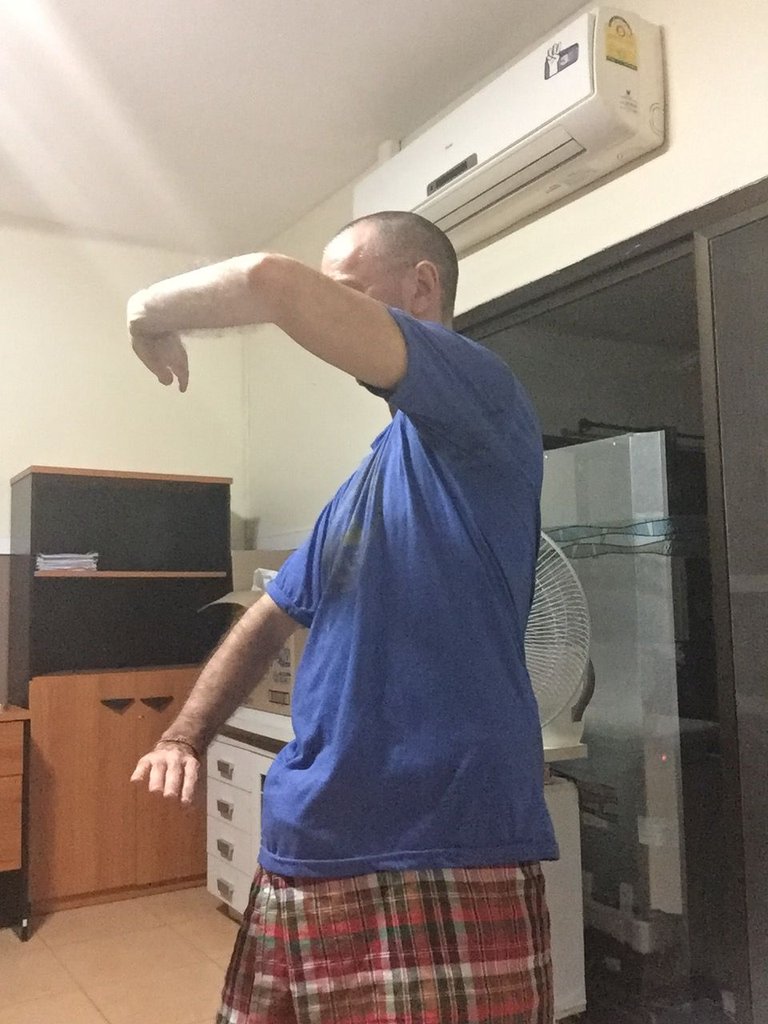
comeback to the middle 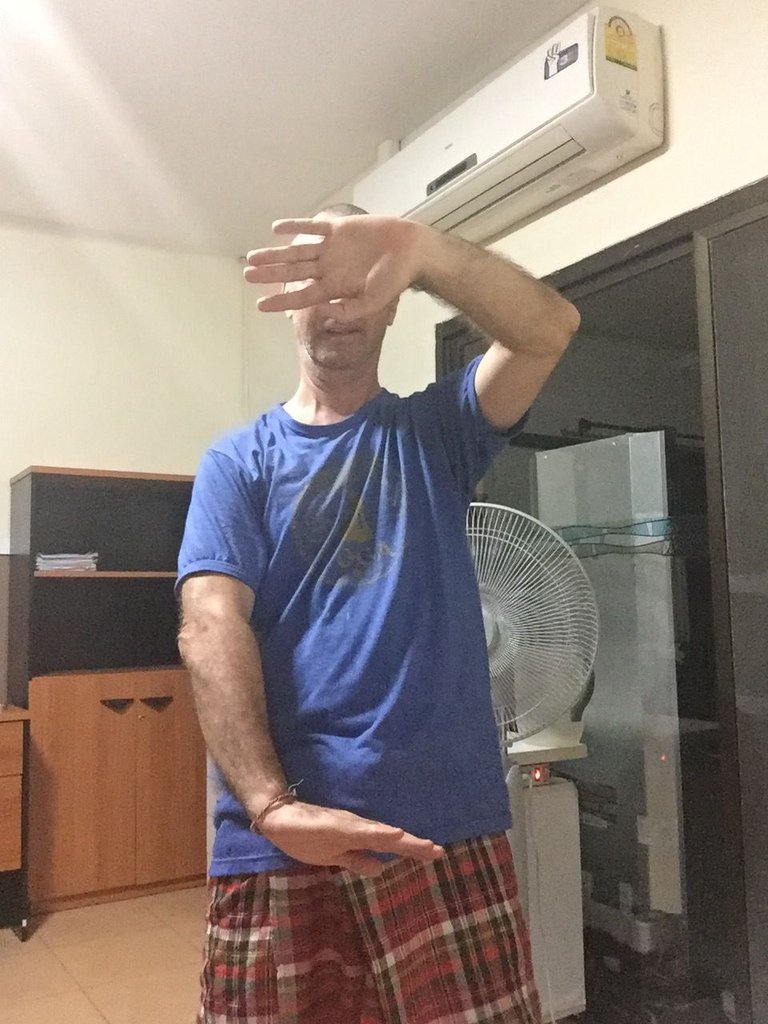
Now the exercise to do between the times of 7-9pm for maximum benefit
Picture no 1
Stand straight with your knees slight bent bring your right hand to just in front of your face in line with the third eye palm facing outwards ,your left hand s palm facing down just below your belly button but above the pubic bone .
twist to the right as far as you can
Then twist to the left as far as you can
come back to the middle
make a full circle and have your left hand on top opposite the third eye and right hand at just above the pubic bone palm down
twist to the left
twist to the right
comeback to the middle
You can do as many as you feel and you can do as fast or slow as you like
if you need to be more energized do it more fast
If you need to be more relaxed do it more slow
Breath in when you raise the hands above and breath out when you do the twisting
Enjoy
Hi! I am a robot. I just upvoted you! I found similar content that readers might be interested in:
http://lieske.com/channels/5e-pericardium.htm
Congratulations @lifeisgood7! You received a personal award!
Click here to view your Board
Do not miss the last post from @steemitboard:
Vote for @Steemitboard as a witness and get one more award and increased upvotes!
Congratulations @lifeisgood7! You received a personal award!
You can view your badges on your Steem Board and compare to others on the Steem Ranking
Vote for @Steemitboard as a witness to get one more award and increased upvotes!